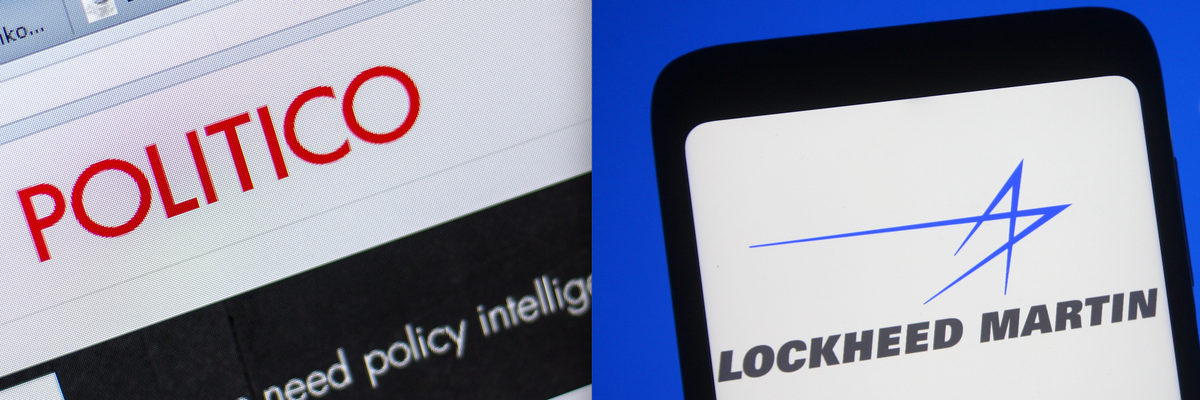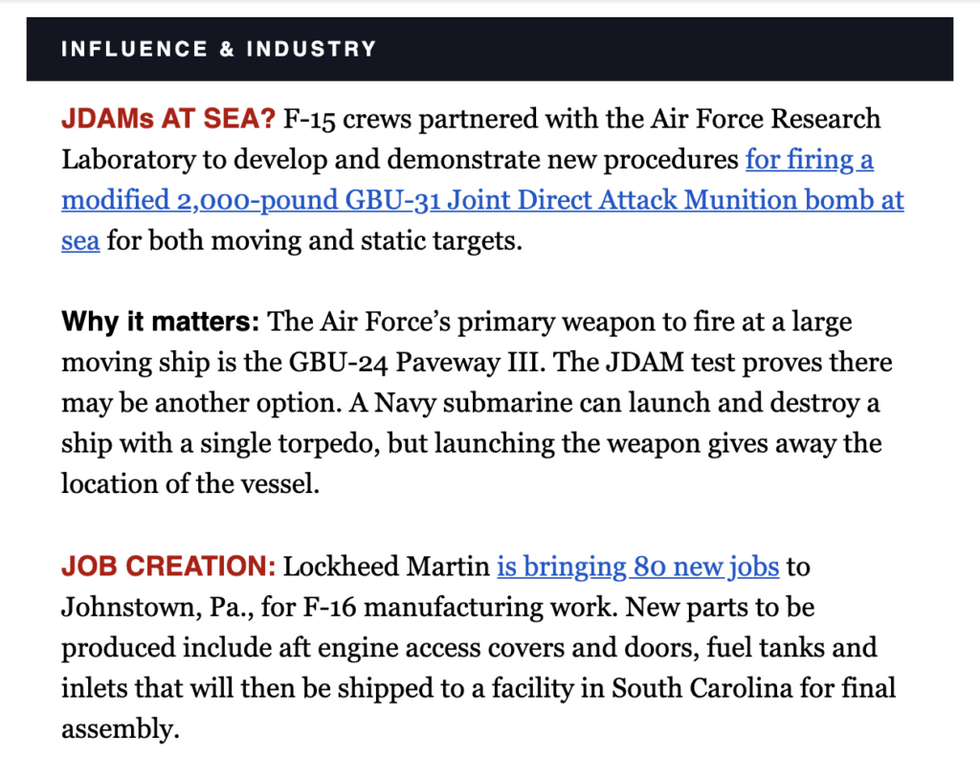There’s a very blurry line between Politico’s financial relationship with the largest weapons firm in the United States, Lockheed Martin, and its editorial output. And that line may have just become even more opaque.
Last week, Responsible Statecraft’s Ethan Paul reported that Politico was scrubbing its archives of any reference to Lockheed Martin’s longtime sponsorship of the publication’s popular newsletter, Morning Defense. While evidence of Lockheed’s financial relationship with Politico was erased, the popular beltway outlet just published a remarkable puff piece about the company, with no acknowledgement of the longstanding financial relationship with Politico.
Politico didn’t respond to questions about whether Lockheed was an ongoing sponsor of the publication after last month when it scrubbed the defense giant’s ads or whether the weapons firm paid for what read largely-like an advertorial.
Politico’s Lee Hudson visited Lockheed’s highly secure, and mostly classified, Skunk Works research and development facility north of Los Angeles and glowingly wrote, “For defense tech journalists and aviation nerds, this is the equivalent of a Golden Ticket to Willy Wonka’s factory, but think supersonic drones instead of Everlasting Gobstoppers.”
Hudson did not elaborate on how a candy-filled wonderland is in any way similar to a facility that designs machines meant to kill people.
So what did she see at this largely closed doors facility and why did she visit?
In fairness to Hudson, she is transparent that Lockheed invited her as part of a PR blitz to drum up more taxpayer funded business.
“Officially — wink-wink — the reason for the visit was a ribbon-cutting for a new state-of-the-art factory on the 539-acre campus,” wrote Hudson. “But unofficially, Lockheed Martin is in the same boat as other contractors: trying to kick up support for more Pentagon business amid flat defense budgets.”
Hudson provides some history of the Skunk Works program, sits in a conference room where she was shown a briefcase allegedly used by the Skunk Work’s founder when visiting CIA headquarters, discusses some of the financial challenges facing the company, and visits a new factory that she conveniently frames as crucial for a great power competition with China, a competition from which Lockheed likely stands to benefit financially.
“The new factory comes as the U.S. faces increasing competition from China. Lockheed — like other companies — must rethink how it does business to remain relevant as Beijing continues to develop advanced capabilities, such as hypersonic weapons and fifth generation aircraft, supporting its position as a regional power,” she writes, mirroring language used by Lockheed CEO James Taiclet in a January earnings call to justify less antitrust regulation of the weapons business in ways beneficial to Lockheed’s bottom-line.
Taiclet told investors, “I mean if you go all the way back to the primary notion that we’re back into a world of great power competition, it’s important to look I think beyond our own defense industrial base structure but outward to those of the competitors, which are China, Russia, Iran, and North Korea for example and compare our capabilities in the defense, if I’m in government, comparing our defense industrial base capabilities to those of the peer group.”
Taiclet didn’t explain why the United States needs to spend over three times as much on military expenditures as China, and neither did Hudson with her “golden ticket” to the military industrial complex.
But Lockheed has an enormous reason to justify ever higher defense spending. It is the largest military contractor in the United States, receiving almost 70 percent of its revenue from the U.S. government in 2018 and accounted for 28 percent of the Defense Department’s total military procurement that year.
Politico doesn’t make mention of that, the $252 million the company spent on lobbying Congress since 9/11, or the fact that the weapons business dramatically outperformed the stock market during the Global War on Terror.
Hudson does get a brief peak at NASA’s X-59 supersonic flight demonstrator, one of Skunk Work’s few unclassified programs, highlighted the company’s “big bets” on hypersonic weapons and, as Politico defense editor Dave Brown proudly noted on Twitter, Dua Lipa’s “Levitating” played on a sound system in the Skunk Works lobby.
But there’s no critical discussion about whether a defense budget that outstrips the State Department by more than ten-to-one — a clear bias towards military dominance and confrontation over diplomacy — or if Lockheed Martin’s push to make the U.S. weapons industry more vertically integrated, at the expense of anti-trust regulations and competition, is actually good for the U.S. economy or U.S. national security.
What’s really unclear about Politico’s puff piece is whether it’s editorial, advertorial, news or analysis. Is this sponsored content? Was Hudson invited to Lockheed’s top-secret facility because of Politico’s longstanding sponsorship agreement with Lockheed? Is that sponsorship ongoing after the outlet attempted to erase any evidence of it last month?
Politico didn’t disclose that information in the article and didn’t respond to our questions which are important for any publication to answer about its content and, if the piece was coincidental with Lockheed’s sponsorship of Morning Defense, an easy set of questions to answer. In fact, just last week, Morning Defense ran a blurb touting how many jobs Lockheed Martin was bringing to a town in Pennsylvania, an anecdote that comes straight out of the company’s promotional talking points.
Indeed, that ambiguity about the relationship between the weapons industry, new outlets, think tanks, and policymakers is a central pillar of the industry’s ability to siphon public funds into their coffers, as they did with $2.02 trillion in U.S. government contracts between 2001 and 2021. And after a two decades of policymakers driving forward with an unwinnable war in Afghanistan that, according to Brown University’s Cost of War Project, cost U.S. taxpayers $2.3 trillion to date and resulted in the deaths of 2,324 U.S. military personnel, 4,007 U.S. contractors and 46,319 Afghan civilians, it’s overdue for some transparency about how weapons firms like Lockheed influence the public discourse about war, weapons spending, and U.S. national security and economic priorities.
















